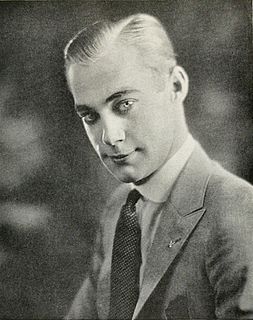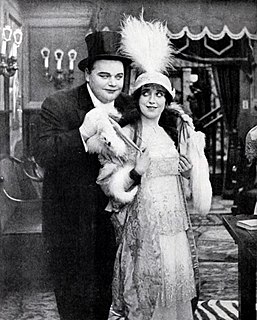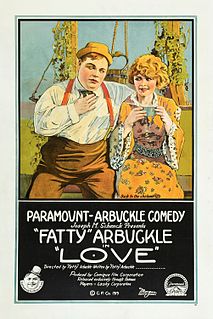
Roscoe Conkling "Fatty" Arbuckle was an American silent film actor, comedian, director, and screenwriter. He started at the Selig Polyscope Company and eventually moved to Keystone Studios, where he worked with Mabel Normand and Harold Lloyd as well as with his nephew, Al St. John. He also mentored Charlie Chaplin, Monty Banks and Bob Hope, and brought vaudeville star Buster Keaton into the movie business. Arbuckle was one of the most popular silent stars of the 1910s and one of the highest-paid actors in Hollywood, signing a contract in 1920 with Paramount Pictures for $14,000.

Al St. John was an early American motion-picture comedian. He was a nephew of silent film star Roscoe "Fatty" Arbuckle, with whom he often performed on screen. St. John was employed by Mack Sennett and also worked with many other leading players such as Charlie Chaplin, Buster Keaton and Mabel Normand. His film career successfully transitioned from the silent era into sound, and by the late 1930s and 1940s he was working predominantly in Westerns, often portraying the scruffy comedy-relief character "Fuzzy Q. Jones". Among his notable performances in that role are in the "Billy the Kid" series of films released by the Producers Releasing Corporation from 1940 to 1946 and in that company's "Lone Rider" series from 1941 to 1943.
These are the films of the American silent film actor, comedian, director, and screenwriter Roscoe Arbuckle. Films marked with a diamond (♦) were directed by and featured Arbuckle. He used the name William Goodrich on the films he directed from 1924 onward.

The Round-Up is a 1920 American silent Western film starring Roscoe "Fatty" Arbuckle and featuring Wallace Beery. The movie was written by Edmund Day and Tom Forman, directed by George Melford, and based on Day's play that was a huge hit for Roscoe Arbuckle's older cousin Macklyn Arbuckle and Julia Dean on the Broadway stage in 1907. It was Macklyn in the play who created the famous phrase used in advertisements of the film, nobody loves a fat man.
The Riot is a 1913 American short comedy film directed by Mack Sennett and starring Fatty Arbuckle.

A Noise from the Deep is a 1913 American short silent comedy film starring Mabel Normand and Roscoe "Fatty" Arbuckle. The film was directed and produced by Mack Sennett and also features the Keystone Cops on horseback.
A Voice from the Deep is a 1912 American short comedy film featuring Roscoe Arbuckle and Mabel Normand.
Murphy's I.O.U. is a 1913 American short comedy film featuring Fatty Arbuckle.
Peeping Pete is a 1913 American short comedy film featuring Fatty Arbuckle.
The Telltale Light is a 1913 American short comedy film featuring Fatty Arbuckle.

When Dreams Come True is a 1913 American short comedy film featuring Fatty Arbuckle.
Some Nerve is a 1913 short comedy film featuring Fatty Arbuckle.

That Little Band of Gold is a 1915 American short comedy film directed by Roscoe "Fatty" Arbuckle and starring Arbuckle, Mabel Normand, and Ford Sterling.

The Other Man is a 1916 short comedy film starring Fatty Arbuckle. The film was shot in Fort Lee, New Jersey.

Love is a 1919 American short comedy film directed by and starring Fatty Arbuckle. Prints of the film survive in collections.
The Fast Freight is a 1922 American comedy film starring Fatty Arbuckle. The film was not released in the US, due to Arbuckle's involvement in the Virginia Rappe scandal. The film is considered to be lost. The film is also known as Via Fast Freight, Handle with Care and Freight Prepaid.
Hey, Pop! is a 1932 American pre-Code comedy film starring Fatty Arbuckle, and the first under Arbuckle's new contract with Warner Brothers.
Addie McPhail was an American film actress. She appeared in more than 60 films between 1927 and 1941. She was the third and last wife of Roscoe "Fatty" Arbuckle. After she retired from acting, she served for 17 years as a volunteer nurse at the Motion Picture & Television Country House and Hospital in Woodland Hills, California.
That Ragtime Band is a 1913 American short comedy film directed by Mack Sennett and featuring Fatty Arbuckle.

Doris Anita Dibble was an actress who appeared in films. She supported Al St. John in comedy roles.
This page is based on this
Wikipedia article Text is available under the
CC BY-SA 4.0 license; additional terms may apply.
Images, videos and audio are available under their respective licenses.








